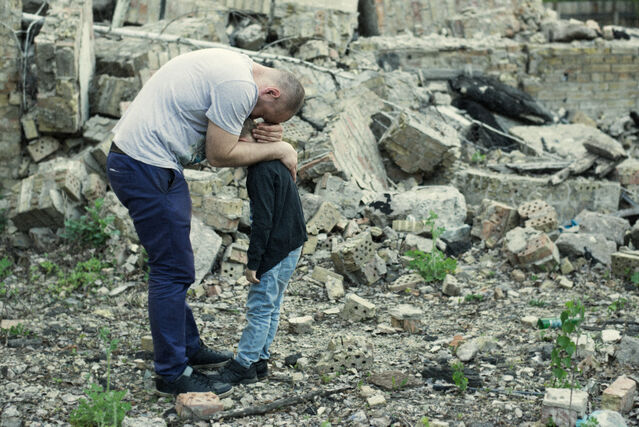Ethics and Morality
Finding Meaning and Purpose in a Frightening World
A modern understanding of the “problem of evil” requires updating our worldview.
Posted March 18, 2022 Reviewed by Tyler Woods
Key points
- The world feels more frightening and demoralizing than ever, the ubiquity of information making it feel like things are getting worse.
- Meaning-making is all about making sense of the world, rendering it coherent and comprehensible, and having a sense of purpose.
- Our simpler, worldviews no longer work. A more evidence-based worldview does allow cautiously optimistic yet realistic conclusions.

A terrifying global pandemic that killed millions and locked down practically every country on the planet, out-of-control climate change with potentially catastrophic consequences, a brutal European war started by a belligerent autocrat controlling enough nuclear missiles to destroy much of civilization,1 deepening political polarization in Western democracies, and rampant conspiratorial disinformation sucking in hundreds of millions of credulous believers across the world.
The world feels to us more frightening and demoralizing than ever before. While a longer, more objective view of history that looks beyond immediate crises suggests significant overall improvement trends over time, the ubiquity of information can certainly make it feel like the world is getting steadily worse.2
Our increased awareness of the instability of our world is deeply unsettling. For many of us, this challenges not only our feelings of existential security but also our entire sense of meaning in life. That sense of meaning is heavily shaped by our worldview.
The social psychologist Roy Baumeister suggests that threatening events may “contradict or disconfirm the person's broad views about self and world, making them no longer viable. The result is a meaning vacuum: a lack of desirable meanings and an inability to make sense of self and world in a satisfactory fashion. Much of human suffering is directly attributable to this loss of meaning.”3 He notes that “the meaning vacuum must be filled; that is, the person must find a way to be able to think and feel in broadly meaningful terms again."4
Meaning and purpose
The human need for coherent meaning in life runs very deep.5 Baumeister’s research identified four basic contributing factors to human meaning: purpose, value, efficacy, and self-worth.6 According to this formulation, an important facet of value is moral justification—which sometimes involves rationalization, to lend a feeling of legitimacy to one’s actions. And an important facet of efficacy is a subjective feeling of control—which is sometimes an illusion, in the face of uncontrollable life events.
More recent Meaning in Life psychological research has found that the main facets are: coherence, purpose, and significance.7 Similarly, another paper refers to these facets as comprehension, purpose, and mattering.8, 9
Meaning-making is thus all about making sense of the world, rendering it coherent and comprehensible, and having a reasonably clear sense of how we can live our lives in purposeful ways that matter and make a difference.
Older, idealistic worldviews
We long to feel that we are part of something larger, something transcendent. For many people, the sense of meaning and purpose is entangled with assumptions that life events happen for intended reasons, part of a larger cosmic plan, and that the universe itself has inherent purpose. Belief in a purposeful universe is pervasive, and not just among conventional religious believers.10, 11
Before the transformative scientific insights of the last few decades, it could quite reasonably have seemed self-evident that our world is purposefully designed and controlled by intentional higher power/s. That notion is now seen as completely incompatible with the scientific worldview.
But, for the average person, it is simply the basic awareness of world events—all the terrible things they see in the world, that is so hard to reconcile with religious or spiritual beliefs. That awareness of world events is inescapable today for anyone with a TV, computer, or smartphone. This is the age-old "problem of evil,"12 magnified in scope by the accessibility of all that information about the sheer immensity and intensity of life’s cruelty. It is increasingly challenging to render all that awareness comprehensible and coherent within a framework of a belief in a benevolent universe guided by a higher power with a higher plan. Invoking the notion that God’s reasons are inscrutable to us can only carry people along so far.
The notion that there can be an overarching “meaning of life” and purpose of existence lacks coherence and plausibility. Modern science, psychology, and philosophy take a more skeptical, cautious view of life and of human nature, with a greater appreciation of complexity, and a more sober appreciation of just how intractable some of life's problems are.
As Baumeister puts it:
The question “What is the meaning of life?” is heard today most often [only] in jokes.…And so [more seriously], if someone asks when we shall know the definitive answer to the question of life's meaning, the answer must be that our ancestors may have known it once, but we are no longer idealistic and gullible enough to believe it. A firm belief in a definitive meaning of life is a form of innocence that may be irrevocably lost, at least at the level of the society as a whole.13
Newer, realistic worldviews
A more evidence-based worldview is nevertheless achievable today, one grounded in science and in careful, rational historical analysis—a worldview that in broad form reflects a general consensus among serious scholars across disparate fields—though, of course, the details are continuously being debated and refined. (For a book-length but accessible explanation of that worldview, see here14).
The framework for that worldview is summarized below, in broad strokes. This way of understanding the world and humankind does allow for cautiously optimistic yet realistic conclusions:
- The universe has no inherent purpose or meaning. Purpose and meaning emerged in primitive form when life arose. Life had its origin in random chemical processes.
- Purpose and meaning evolved to become more complex as living creatures evolved to become more complex (further embellished by the evolution of consciousness). Biological evolution is a blind, spontaneous and unguided process.
- Purpose and meaning reached their most complex, elaborate form in humans (the most complex creatures known to us) shaped by both biological and cultural evolution.
- Morality is not inherent to the universe. Morality emerged and evolved out of the cooperative and bonding instincts of higher animals, reaching its most complex form in humans.
- Illnesses and natural disasters are one side of the so-called problem of evil. These are governed by the same kinds of natural causes as everything else. They can happen to anyone, anytime. While it’s a natural human tendency to ask “Why me?” when something bad happens to us, a logical response to that question is “Why not me?”
- Harm inflicted by people is the other side of the problem of evil. Humans have natural tendencies toward violence, cruelty, selfishness, and irrationality. They also have natural tendencies toward extraordinary levels of cooperation, empathy, and rationality. Fortunately, the prosocial tendencies have had an overall evolutionary advantage over the antisocial tendencies in biological and cultural adaptation.
- Cooperation and compassion have taken an especially strong lead over violence and cruelty in modern, educated, secular, democratic societies (particularly those on the road to full gender equality and multiculturalism), compared with most large societies in human history.
- We live in a world that is generally more governed by rationality than in the past. Rationality is largely, though imperfectly, correlated with general levels of education of the populace. It is more effectively instilled when specific techniques and habits of critical thinking are systematically taught, and when people are taught how to differentiate credible from non-credible sources of information.
- Scientific innovation can and has risen to the challenge of problem-solving in relation to global crises such as pandemics and climate change (e.g., vaccines produced in record time; a plethora of clean energy innovations). The limiting factor tends not to be innovation but popular buy-in, which is dependent on political will, effective leadership, and rational choices by citizens. Most people eventually buy in. We would do better if we could find ways to speed up that process.
- In our complex, modern world, larger volumes of interdependent trade between countries have the effect of reducing their likelihood of going to war against each other. Open democracies are much less likely to go to war against each other.
- There is reason to be cautiously optimistic about the course of human history and future of humanity, though it may be a case of “two steps forward, one step back” toward gradually greater cooperativeness, compassion, and rationality.
- History does not proceed according to a grand plan, working its way toward an ultimate purpose. There is obviously no guarantee that violence will continue to decline, or that morality will continue to increase. The twentieth century demonstrated that there can be calamitous reversals of this trend. But the longer trend of history has so far moved toward a more peaceful, caring world—falteringly, yet definitively.15
- There is at least a fair chance of this trend continuing into the future, most especially in educated, secular, democratic, interdependent societies—albeit with the ongoing potential for dreadful temporary reversals.
- It’s up to each one of us to determine our individual and collective future.
No gods will help us.
References
1. Writing at the time of the Russian invasion of Ukraine.
2. At least for those of us who in our own lives had been fortunate not to have been living in poverty or under oppression or in a war zone.
3. Roy Baumeister, Meanings of Life (New York: The Guilford Press, 1991), p. 266. He adds: “Even physical pain, which is unpleasant regardless of meaning, is all the more unpleasant when accompanied by a meaning vacuum. People who suffer from chronic bodily pain often experience it as a riddle or puzzle, and they become preoccupied with finding some way to make sense of it."
[Click 'More' to view footnotes 4-15].
4. Baumeister, Meanings of Life, p. 268.
5. Actually, we humans are preoccupied with meaning in just about everything that we do—we are wired to decipher meaning from, and assign meaning to, our experiences. Our brain creates mental representations from our perceptions. In its constant pattern-seeking, it identifies connections and commonalities between different representations. It may then create a higher-level representation of the essence of that commonality, represented in abstract symbolic terms. This is also the basis for language. As Baumeister puts it: “Thinking usually involves meaning, as in the use of language, symbols, and connections between concepts.” [Baumeister, R. F., & Vohs, K. D. (2002). The pursuit of meaningfulness in life. In C. R. Snyder & S. J. Lopez (Eds.), Handbook of positive psychology (pp. 608–618). Oxford University Press]. In his book Meanings of Life, Baumeister suggests that “the meaning of life is the same kind of meaning as the meaning of a sentence in several important respects: having the parts fit together into a coherent pattern, being capable of being understood by others, fitting into a broader context, and invoking implicit assumptions shared by other members of the culture.” (Baumeister, Meanings of Life, p.16.)
6. Baumeister, Meanings of Life, Ch.3, pp. 29-57.
7. Martela, F., & Steger, M. F. (2016). The three meanings of meaning in life: Distinguishing coherence, purpose, and significance. The Journal of Positive Psychology, 11(5), 531–545. https://doi.org/10.1080/17439760.2015.1137623
8. George, L. S., & Park, C. L. (2016). Meaning in Life as Comprehension, Purpose, and Mattering: Toward Integration and New Research Questions. Review of General Psychology, 20(3), 205–220. https://doi.org/10.1037/gpr0000077
9. Most people interested in this topic are familiar with the older, seminal work on meaning by the Austrian psychiatrist Victor Frankl, who developed his theories and clinical approach to meaning-making before World War II but refined it during and after his imprisonment in Nazi concentration camps, where he lost several family members. He published his famous book Man’s Search for Meaning; An Introduction to Logotherapy in 1946. Frankl held that striving to find meaning in life is the primary, most powerful motivating and driving force in humans. He argued that we cannot choose or control many of the events that happen to us, but we can choose how we respond: "Everything can be taken from a man but one thing: the last of the human freedoms – to choose one's attitude in any given set of circumstances, to choose one’s own way." Frankl’s personal experience lent him tremendous credibility, but I would add some cautionary, qualifying comments. Frankl insisted that people are free to choose their attitude to suffering, but this assumption fails to acknowledge that psychological resilience is itself determined by factors beyond a person’s control (inborn temperament and early childhood experience) and is essentially a matter of luck. This may sound pessimistic, but it enables a nonjudgmental, empathic view of people who are fragile and who are unable to sustain a positive attitude. An individual’s resilience versus vulnerability is determined by a complex interplay of genetic and early environmental factors. Resilience was poorly understood in the field of psychiatry in Frankl’s time. Knowing what we do today, it would be uninformed and simplistic for us to make judgments about lack of resilience, or to assume that it is simply a matter of will or choice.
10. It is a belief generally also shared by many followers of more nuanced theologies that don’t subscribe to a belief that specific events in our individual lives happen for intended reasons. It’s also typically shared by “spiritual but not religious” people who may not even believe in a “personal god” who intervenes in our individual lives.
11. Parts of this article are adapted from: Ralph Lewis, Finding Purpose in a Godless World: Why We Care Even If The Universe Doesn’t (Amherst, NY: Prometheus Books, 2018).
12. The question of how to reconcile the existence of evil and suffering with an omnipotent, omnibenevolent, and omniscient God.
13. Baumeister, Meanings of Life, p. 368.
14. Ralph Lewis, Finding Purpose in a Godless World: Why We Care Even If The Universe Doesn’t (Amherst, NY: Prometheus Books, 2018). The book synthesizes and clearly explains to a general educated reader the scientific worldview of a universe, life and consciousness that are entirely the products of spontaneous, unguided evolutionary processes. It delves into questions of how human purpose, meaning and morality emerged and evolved, biologically and culturally, in a universe that is essentially godless and lacking inherent purpose. Dr. Lewis infuses the book with his perspective as a psychiatrist working in the trenches of the human condition, sharing his clinical insights as well as his personal life experiences (including his wife’s life-threatening cancer) to enrich and personalise the book, and to access profound existential philosophical insights.
15. See Steven Pinker, The Better Angels of Our Nature: Why Violence Has Declined (New York: Viking, 2011); and Enlightenment Now: The Case for Reason, Science, Humanism, and Progress (New York: Viking, 2018). See also Michael Shermer, The Moral Arc: How Science and Reason Lead Humanity Toward Truth, Justice, and Freedom (New York: Henry Holt, 2015). And Hans Rosling, Factfulness: Ten Reasons We're Wrong About the World--and Why Things Are Better Than You Think (New York: Flatiron Books, 2018). And for a visual depiction of how the world is getting much better, see Max Roser, “The short history of global living conditions and why it matters that we know it” (Our World in Data, 2020): https://ourworldindata.org/a-history-of-global-living-conditions-in-5-charts/. Or https://www.vox.com/2014/11/24/7272929/global-poverty-health-crime-literacy-good-news.




